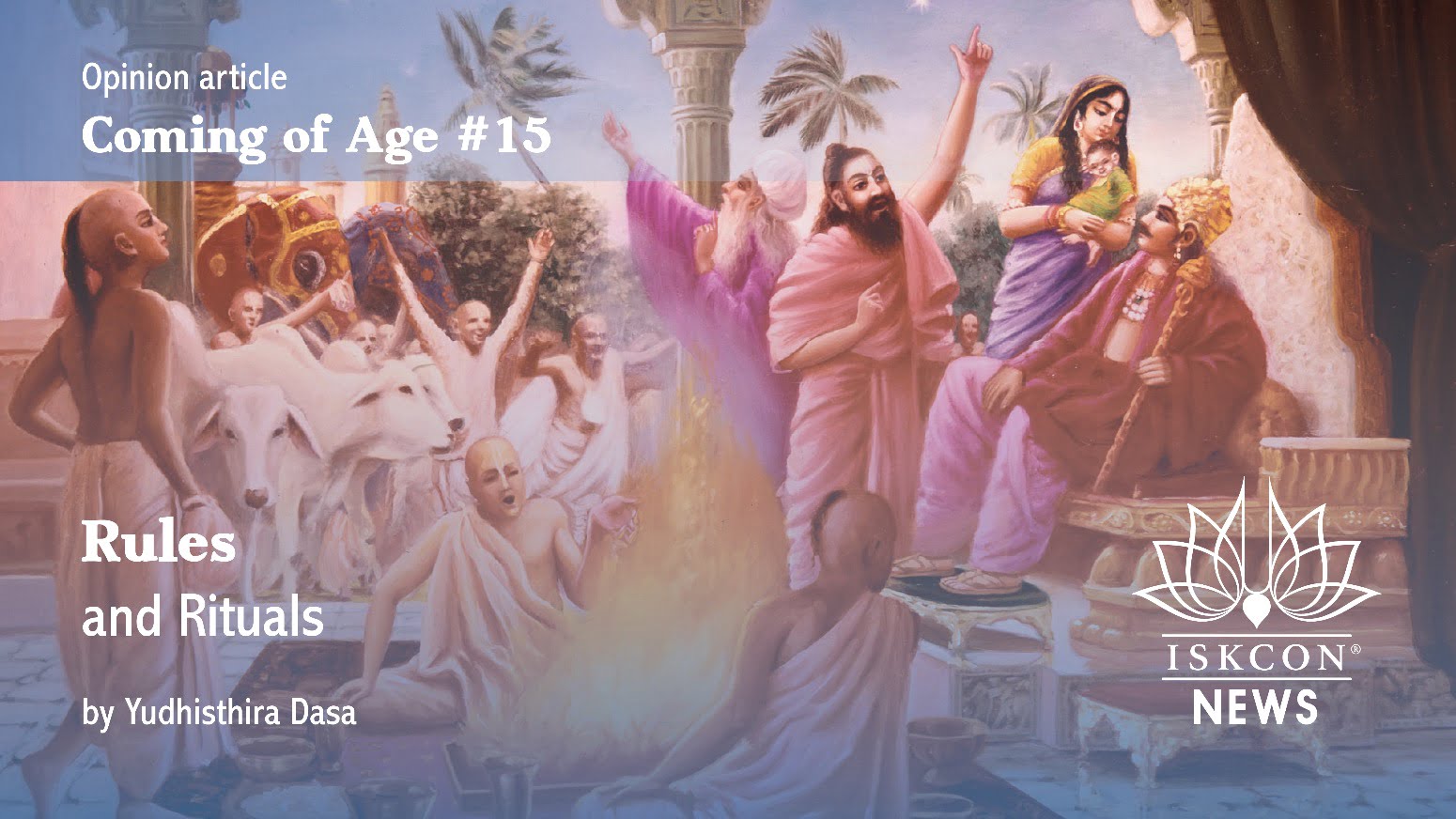COMING OF AGE #15 – Rules and Rituals
By Yudhisthira Dasa | May 04, 2024

We are rule-breakers. Otherwise, our minute independence and free will would not have brought us to these bodies in the material world. Of course, some souls take birth here just for pure loving service, but these eternally liberated souls are few in number compared to the rest of us!
Thomas Keating, a Trappist Monk in the Catholic tradition (1923-2018), is known as one of the developers of what has come to be known as “centering or contemplative prayer.” Listening to him recently, I heard him speak about rules and rituals and how people in this world largely rebel against rules and regulations for many reasons.
With that in mind, Srila Prabhupada is quoted as saying, “You have to bow down. If you don’t bow down to Krishna and His representative, then you will be forced to bow down to something else, Maya (the material energy). That is your position. You cannot be (fully) free at any moment.”
Thomas Keating put it this way (paraphrased) when he spoke about those not wanting to follow the rules and rituals of a bonafide spiritual path: “There are even more rules to follow in material life; we’re just not aware of them until we try to break them, whether knowingly or unknowingly. People complain about rules and practices in religion. Why? Mostly because they feel those ‘rituals’ often fall into a blind following, largely empty of deep meaning, reflection, and realization. However, there are even more rules and practices required in material life; although we don’t think about them, what to speak of dwell on the vast majority of them until we get caught, even if we break the rules unknowingly. In contrast, spiritual life is ruled by love of the Supreme Lord and His devotees.” Those curious about Thomas Keating’s Centering Prayer may use Google to find and read about its many similarities to the path of Bhakti.
The path of Gaudiya Vaishnavism is called sadhana and is divided between vaidhi-bhakti and raganuga-bhakti.. Srila Prabhupada said: “So, Krishna is ready to accept our service in so many ways. If you cannot establish the Deity, then you simply hear about Him. That is the most important thing. We do not require to establish a temple everywhere. If possible to establish a temple and serve Krishna properly according to the regulations mentioned in the sastras or instructed by the spiritual master, that is called vaidhi-bhakti. Vaidhi-bhakti means discharging devotional service under regulative principles. So, without vaidhi-bhakti, you cannot jump to raga-bhakti. Raga-bhakti is spontaneous. That does not require any regulative principles” (Srimad Bhagavatam 3.26.41 lecture, Bombay, January 16, 1975). We have been given so many examples of unconditional and spontaneous love, such as a mother’s love for her child. The love and service to that child are spontaneous.
Some questions beg to be asked:
1. Is this transition from vaidhi-bhakti to raga-bhakti like opening a door and stepping through, or is it a gradual transition with ebbs and flows like the current of the ocean?
2. Do we as human beings tend to rationalize our practices to a lower level of practice, based on our time, place, and circumstances?
3. While we surely should discriminate with whom we associate intimately, should we offer full respect to those conditioned souls who may be more materially conditioned externally since their true nature is just like ours, as an eternal spirit soul connected to all other souls and God Himself?
4. Although, as Prabhupada said, creating a spiritual institution in the material world is very challenging, instead of dwelling on the negativity, should we remind ourselves to be constructive instead of destructive in our comments and suggestions about the institution?
How did you answer these four questions? If you answered “YES” to all four questions, you are probably more peaceful and happy than those who answered “NO” to any of them. Rules and regulations are tools for becoming God-conscious. To follow strictly, somewhat strictly, or not to follow at all is our choice. In time, we will all reach Krishna prema (love of God) since that is our eternal constitutional position. YES!!!
















